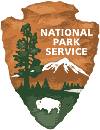Earth Science Week Classroom Activities
Discovering Fossils

Activity Source:
Adapted with permission from the National Park Service.
A fossil is any evidence of past life preserved in a geologic context, such as within rock or sediment. This activity allows you to explore the process used by paleontologists — scientists who study fossils to understand ancient landscapes, climate, and life on Earth — to find and identify fossils.
A day or two before beginning this lesson, the teacher must prepare “fossils” for students to excavate:
- First, put on a mask to protect your nose and mouth. Mix Plaster of Paris with soil or sawdust until the consistency is almost as thick as mashed potatoes.
- Pour this mixture into paper cups until it covers the bottom of the cup (one cup per student).
- Drop in a chicken bone or shell and cover with more plaster mixture.
- Allow to dry for a day or two, then remove paper cups.
The National Park Service preserves fossils of many types of organisms and trace evidence of their living patterns, such as tracks and burrows. Fossils provide visitors with views of spectacular landscapes of the past. Because fossils are irreplaceable, it is important to protect them. If you find one in a park, leave the fossil where it is and share your discovery with a park ranger.
Materials
- Fossil notebooks or note paper and pen or pencil
- Plaster of Paris
- Sawdust or soil
- 1 small paper cup per student
- 1 small chicken bone or shell per student
- Construction paper
- Craft sticks
- Small paintbrushes
Procedure
1. Take one of the previously prepared hidden “fossils” in plaster. Use construction paper as a workspace.
2. Using craft sticks as picks, pick away at the plaster to reveal the embedded fossils, taking care not to damage the fossils. Use paintbrushes to remove smaller particles of plaster from the fossils.
3. Describe and illustrate your fossil in your fossil notebook or on your note paper.
4. Discuss: What did you enjoy about the process of “digging out” your fossil? Was there anything you did not enjoy? What qualities should a paleontologist have to be successful at finding and excavating fossils? Can anyone look for fossils in national parks? Why or why not?
National Fossil Day
On the Wednesday of Earth Science Week, celebrate the National Fossil Day!
Events are being held nationwide to encourage people to explore and appreciate
the animal, plant, and trace fossils in national parks and other public lands.
Paleontologists and park rangers are sharing fossil discoveries and explaining
the importance of preserving fossils so everyone can share a sense of
discovery!
